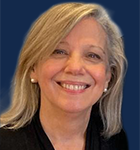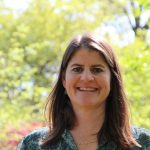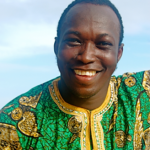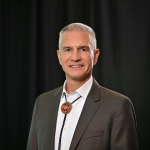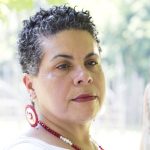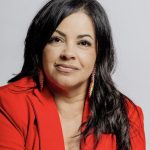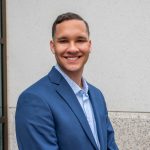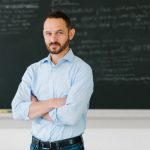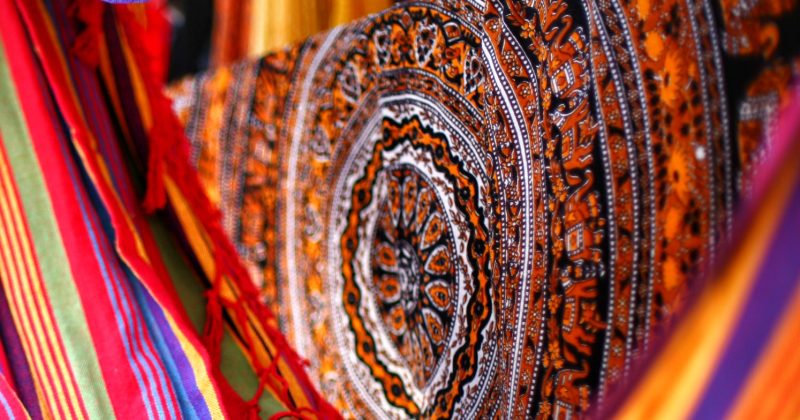
October 5, 2023
10:00 a.m.-4:00 p.m., The Friday Conference Center, Chapel Hill
1.0 CEU
$95
Support Provided By:
Anonymous Trust
Longview Foundation
Office of the Provost
WRESA
There are over 476 million Indigenous people living in over 5,000 distinct groups in 90 countries across the world (United Nations). Indigenous peoples represent distinct social, cultural, and political groups worldwide that share overlapping challenges about the protection of their rights, their lands, and their well-being as distinct peoples.
The 2023 UNC World View K-12 Global Education Symposium will explore the meaning of global Indigeneity while examining the complexities of Indigenous identity and life. We will discuss the commonalities among the world’s Indigenous and Native peoples, as well as what makes them profoundly diverse and different from one another. Some of the topics we may examine include local and global issues impacting Indigenous individuals, communities, peoples, and governance; Indigenous languages and language preservation; sovereignty and self-determination; cultural resilience; and respecting ancestral lands, waters, and territories. Educators will gain knowledge and resources about global Indigeneity through the voices, perspectives, and experiences of many.
Registration is now closed, however, we will accept on-site registration on the morning of October 5 at the Friday Conference Center in Chapel Hill. Please arrive by 9:30am to register on-site. Location information below.
Schedule
| 9:30am | Registration, Continental Breakfast, and Meet the Exhibitors | ||
| 10:00am | Welcome Address Amy Locklear Hertel, JD, PhD (Coharie/Lumbee), Executive Vice Provost, UNC-Chapel Hill Charlé LaMonica, Director, World View, UNC-Chapel Hill |
||
| 10:10am | The Past and Present of Colonialism and Settler Colonialism Daniel M. Cobb, Professor, Department of American Studies, UNC-Chapel Hill |
||
| 10:50am | Native Agency in and Beyond the United States: the Past, Present, and Future of Federal-Indigenous Relations Valerie Lambert (enrolled citizen, Choctaw Nation), Professor, Department of Anthropology, UNC-Chapel Hill |
||
| 11:45am | Traditional Dance and Music Heritage of Mali Souleymane Solo Sana, Traditional Malian Dancer Accompanied by drummers that are masters in Malian Traditional music |
||
| 12:30pm | Lunch (provided) | ||
| 1:15pm | CONCURRENT SESSIONS I |
||
| 2:00pm | Break, Meet the Exhibitors, and Transition to Next Session | ||
| 2:15pm | CONCURRENT SESSIONS II | ||
| 3:00pm | Break, Meet the Exhibitors, and Transition to Next Session | ||
| 3:15pm | Panel: Contemporary Native Voices of North Carolina Confirmed Panelists: Jonathan Caudill, Chief, Meherrin Nation Greg Jacobs, Citizen of the Coharie Tribe and Tribal Administrator, Coharie Intra-Tribal Council Vivette Jeffries-Logan, Citizen of the Occaneechi Band of the Saponi Nation (OBSN) and Founding Partner, biwa|Emergent Equity, Inc. Betty Oxendine Mangum, Enrolled member Lumbee Tribe of North Carolina and Elder-in-Residence, Carolina American Indian Center Juanita Wilson, Enrolled member and Talent & Development Program Director, Eastern Band of the Cherokee Indians (EBCI) Dorothy Stewart Yates, Chair, Sappony Pamela Young-Jacobs, Vice Chief of the Waccamaw Siouan Tribe of North Carolina Moderator Kerry Bird (Enrolled citizen of the Sisseton-Wahpeton Oyate and of Lumbee tribal heritage), Director, NC American Indian Heritage Commission, NC Department of Natural and Cultural Resources |
||
| 4:00pm | Next Steps and Adjournment Kerry Bird (Enrolled citizen of the Sisseton-Wahpeton Oyate and of Lumbee tribal heritage), Director, NC American Indian Heritage Commission, NC Department of Natural and Cultural Resources |
Welcomer
Director of UNC World View Charlé LaMonica has held service to the state front and center in her work. Since 2013, LaMonica has expanded UNC World View’s support of educators and increased partnerships in both rural and urban settings. LaMonica and the World View team have led more than 21 global study visits, taking K-12 and community college educators around the world to learn about educational systems, classroom experiences, history, business and culture. Since the founding of UNC World View in 1998, more than 25,000 teachers have participated in UNC World View programs from every county in North Carolina
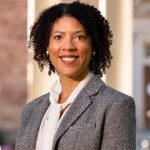 Amy Locklear Hertel, JD, PhD, MSW (Coharie/Lumbee), Executive Vice Provost, UNC- Chapel Hill, serves as Executive Vice Provost at UNC Chapel Hill. She provides guidance and oversees the work of the Vice Provost for Academic and Community Engagement Centers, Associate Provost for the Student Leadership Initiative, Associate Provost for Interprofessional Health Initiatives, Executive and Artistic Director of Carolina Performing, and Director of Provost Initiatives. Dr. Hertel is a Clinical Assistant Professor at the UNC School of Social Work, with research and practice centering on indigenous knowledge and values as an asset to inform social and political action, leadership, and community development. Her work is informed by the worldview of the indigenous communities she is from as well as those she has partnered with over the years in North Carolina and beyond. She is a citizen of the Lumbee Tribe of North Carolina and a descendant with close ties to the Coharie Indian Tribe.
Amy Locklear Hertel, JD, PhD, MSW (Coharie/Lumbee), Executive Vice Provost, UNC- Chapel Hill, serves as Executive Vice Provost at UNC Chapel Hill. She provides guidance and oversees the work of the Vice Provost for Academic and Community Engagement Centers, Associate Provost for the Student Leadership Initiative, Associate Provost for Interprofessional Health Initiatives, Executive and Artistic Director of Carolina Performing, and Director of Provost Initiatives. Dr. Hertel is a Clinical Assistant Professor at the UNC School of Social Work, with research and practice centering on indigenous knowledge and values as an asset to inform social and political action, leadership, and community development. Her work is informed by the worldview of the indigenous communities she is from as well as those she has partnered with over the years in North Carolina and beyond. She is a citizen of the Lumbee Tribe of North Carolina and a descendant with close ties to the Coharie Indian Tribe.
As former Chief of Staff for two chancellors, Dr. Hertel was appointed as co-captain of the first strategic initiative in the university’s strategic plan, Carolina Next: Innovations for Public Good, Build Our Community Together, which reflects her interest and experience with bringing people together around a common, self-determined goal. Before joining the Chancellor’s Office, she served as the second director of the UNC American Indian Center, where she collaborated with faculty across a variety of disciplines to participate in meaningful and reciprocal research and community engagement with native nations.
Dr. Hertel attended UNC Chapel Hill, where she earned a BA in Communication Studies, and Washington University in St. Louis, where she earned her MSW, JD, and PhD in Social Work.
Plenary Speakers
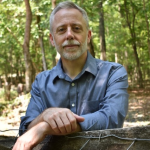 Daniel M. Cobb, Professor, Department of American Studies, UNC-Chapel Hill, joined UNC-Chapel Hill’s Department of American Studies in fall 2010, after serving as a faculty member in the History Department at Miami University in Oxford, Ohio, and as Assistant Director of the D’Arcy McNickle Center for American Indian and Indigenous Studies at the Newberry Library in Chicago. Cobb’s research and teaching focus on American Indian history since 1887, political activism, ethnohistorical methods, ethnobiography, memory, and global indigenous rights. His first book, NATIVE ACTIVISM IN COLD WAR AMERICA: THE STRUGGLE FOR SOVEREIGNTY (2008), won the inaugural Labriola Center American Indian National Book Award in 2009. In addition to publishing, Cobb enjoys working on projects that engage the public and has created or developed many events and an exhibition devoted to American Indian culture and politics. In 2016, he completed a 24-lecture GREAT COURSES ON AMERICAN INDIAN HISTORY in partnership with The Teaching Company and the Smithsonian Institution’s National Museum of the American Indian. Cobb has also been involved in Teaching American History and other professional development programs for public school teachers sponsored by the National Council for History Education, National Underground Railroad Freedom Center, Ohio Historical Society, and Ohio Humanities Council.
Daniel M. Cobb, Professor, Department of American Studies, UNC-Chapel Hill, joined UNC-Chapel Hill’s Department of American Studies in fall 2010, after serving as a faculty member in the History Department at Miami University in Oxford, Ohio, and as Assistant Director of the D’Arcy McNickle Center for American Indian and Indigenous Studies at the Newberry Library in Chicago. Cobb’s research and teaching focus on American Indian history since 1887, political activism, ethnohistorical methods, ethnobiography, memory, and global indigenous rights. His first book, NATIVE ACTIVISM IN COLD WAR AMERICA: THE STRUGGLE FOR SOVEREIGNTY (2008), won the inaugural Labriola Center American Indian National Book Award in 2009. In addition to publishing, Cobb enjoys working on projects that engage the public and has created or developed many events and an exhibition devoted to American Indian culture and politics. In 2016, he completed a 24-lecture GREAT COURSES ON AMERICAN INDIAN HISTORY in partnership with The Teaching Company and the Smithsonian Institution’s National Museum of the American Indian. Cobb has also been involved in Teaching American History and other professional development programs for public school teachers sponsored by the National Council for History Education, National Underground Railroad Freedom Center, Ohio Historical Society, and Ohio Humanities Council.
Valerie Lambert is an enrolled citizen of the Choctaw Nation and professor of anthropology at UNC-Chapel Hill. She received her Ph.D. in Social Anthropology from Harvard University. Professor Lambert is the author of Native Agency: Indians in the Bureau of Indian Affairs, which won the 2022 Labriola Center American Indian National Book Award for, as the award states, “the best scholarship for advancing the field of American Indian and Indigenous studies.” In addition, Native Agency was awarded 2022 Best Subsequent Book Award Honorable Mention by the Native American and Indigenous Studies Association. Professor Lambert’s first book, Choctaw Nation: A Story of American Indian Resurgence, told the story of her Tribe in the modern era, and it won the Native North American Prose Award. Professor Lambert has twice served as president of the Association of Indigenous Anthropologists, and she is president of the Choctaw Nation Tribal Chapter of the American Indian Science and Engineering Society. She was reared in Oklahoma.
Souleymane Solo Sana is an accomplished traditional dancer from Mali, West Africa. Dedicated to the preservation of traditional dance, music, and culture Solo is committed to continuous research to maintain an accurate representation and disbursement of traditional information, movement, and rhythm. A former principal member of one of the premiere companies of Mali, Ballet Du District de Bamako, he is a leader among artists. Solo’s presence at local ceremonies and festivals in Mali has always been in high demand, performing with renown griots and musicians as well as internationally known artists such as Djeneba Seck and Oumou Sangare. With an extensive knowledge of traditional dances of the Mande culture he is highly sought after as an instructor for private and group lessons teaching students from around the world including internationally acclaimed dancers, university instructors, and Broadway performers. Currently Solo splits his time between teaching and performing in the United States and running Kono Gnaga, his NGO in Mali with a mission to preserve traditional dance and music. Solo made his choreographic premiere in New York City in the Spring of 2014 and has most recently embarked on the creation of Sira Koro, a dance and music ensemble in Mali, where he serves as Artistic Director and choreographer with a mission to bring new perspective to traditions while simultaneously providing opportunities for young artists in Mali.
Panelists
Jonathan Caudill, Chief, Meherrin Nation
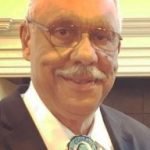 Greg Jacobs is a citizen of the Coharie Tribe and serves as the Tribal Administrator for the Coharie Intra-Tribal Council, headquartered at the historic Eastern Carolina Indian School and present-day Coharie Tribal Center in Clinton, NC. Mr. Jacobs, himself a graduate from Clinton High School, went on to study at East Carolina University. Mr. Jacobs is a graduate of the inaugural cohort of NC Native Leadership Institute of UNC-Chapel Hill. He oversees the day-to-day operations of the Tribal Center, administering a variety of programs ranging from Healthy Native North Carolinians, the Great Coharie River Initiative, and other programs meeting the wellness, housing and economic development needs of his community. Mr. Jacobs also serves on the board for United Tribes of North Carolina. In 2014, he was recognized and awarded the title of “Elder of the Year” by the North Carolina Native American Youth Organization. Also, in 2019 he was “Elder in Residence” by the American Indian Center at UNC-Chapel Hill
Greg Jacobs is a citizen of the Coharie Tribe and serves as the Tribal Administrator for the Coharie Intra-Tribal Council, headquartered at the historic Eastern Carolina Indian School and present-day Coharie Tribal Center in Clinton, NC. Mr. Jacobs, himself a graduate from Clinton High School, went on to study at East Carolina University. Mr. Jacobs is a graduate of the inaugural cohort of NC Native Leadership Institute of UNC-Chapel Hill. He oversees the day-to-day operations of the Tribal Center, administering a variety of programs ranging from Healthy Native North Carolinians, the Great Coharie River Initiative, and other programs meeting the wellness, housing and economic development needs of his community. Mr. Jacobs also serves on the board for United Tribes of North Carolina. In 2014, he was recognized and awarded the title of “Elder of the Year” by the North Carolina Native American Youth Organization. Also, in 2019 he was “Elder in Residence” by the American Indian Center at UNC-Chapel Hill
Vivette Jeffries-Logan, Citizen of the Occaneechi Band of the Saponi Nation (OBSN) and Founding Partner, biwa|Emergent Equity, Inc. is a citizen of the Occaneechi Band of the Saponi Nation. She served her People as an elected member of the Tribal Council and as Founding Director of the OBSN Tribal Health Circle. Vivette was a trainer with Dismantling Racism Works (dRworks), served as the Director of Training and Technical Assistance at a state domestic violence coalition, and served on the Advisory Board for the American Indian Center at a local university. She also served as Curriculum Designer and Instructor for the Working Effectively with Tribal Government course for the Centers for Disease Control and as Core Faculty with the William C. Friday Fellowship for Human Relations. She was recognized as an Honoree at the Women’s Honor Ceremony during the American Indian Women of Proud Nations Conference. United Tribes of North Carolina also honored her with the Distinguished Service to Indian People Award. Vivette earned a B.A. in Psychology and Community Studies from Guilford College and an Associate Degree (A.A.S) in Hospitality Management from Alamance Community College. She is a graduate of the North Carolina Native Leadership Institute of the American Indian Center at the University of North Carolina. She is also a Certified Executive Chef with 17 years’ experience in Hospitality Leadership and Management. She is currently matriculating in her second year of the Leadership for Sustainability Master’s program at the University of Vermont. When not at work you can find Vivette laughing with relations, talking story in beloved community, baking legendary pound cakes and other southern delicacies, and attending powwows and gatherings across the state.
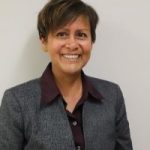 Juanita Wilson is an enrolled member of the Eastern Band of Cherokee Indians (EBCI). She oversees the Training & Development department of the EBCI. Wilson and her team are responsible for the professional development of 1,200+ employees. Wilson graduated from Western Carolina University (WCU) with a Bachelor of Science in Sociology. She completed her Master of Science in Leadership and Management at Montreat College. Wilson’s love for collaborative partnership work has taken her on a journey through a broad spectrum of experiences, including a directorship with the Cherokee Preservation Foundation, executive leadership with the EBCI, and directorship with Western Carolina University. From all these experiences, Wilson had gained valuable lessons from a variety of wise and experienced mentors, to whom she owes much and has been privileged to serve on numerous boards and committees and has participated in state-wide and national leadership development programs, some of them specifically focused on Native American leadership.
Juanita Wilson is an enrolled member of the Eastern Band of Cherokee Indians (EBCI). She oversees the Training & Development department of the EBCI. Wilson and her team are responsible for the professional development of 1,200+ employees. Wilson graduated from Western Carolina University (WCU) with a Bachelor of Science in Sociology. She completed her Master of Science in Leadership and Management at Montreat College. Wilson’s love for collaborative partnership work has taken her on a journey through a broad spectrum of experiences, including a directorship with the Cherokee Preservation Foundation, executive leadership with the EBCI, and directorship with Western Carolina University. From all these experiences, Wilson had gained valuable lessons from a variety of wise and experienced mentors, to whom she owes much and has been privileged to serve on numerous boards and committees and has participated in state-wide and national leadership development programs, some of them specifically focused on Native American leadership.
Dorothy Stewart Yates, a member of the Sappony Tribe, resides in Roxboro, NC. She is a retired educator of 35 years from the Person County Schools. She served as the Title VI American Indian Education Coordinator for Person County Schools for 32 years. Mrs. Yates served part time as the math tutor for the Person County Early College and as a math tutor at Person High School since her retirement until the pandemic. Mrs. Yates was elected as the Sappony Tribal Council Chairperson where she has served in this position for 38 years. She is the Sappony Tribe’s representative on the North Carolina Commission of Indian Affairs where she serves as the Vice-Chair, as well as on the Executive Board, the Goals Committee, the Recognition Committee, the Indian Child Welfare Committee, and as Chairperson of the Indian Education Committee. Mrs. Yates is the NCCIA’s representative on the State Advisory Council on Indian Education to the NC State Board of Education. She also serves on the American Indian Fund Scholarship Board. Mrs. Yates is also active in her community. She is a member of Calvary Baptist Church of Roxboro, NC, where she presently volunteers as pianist/organist, church clerk, and on the Executive Committee. Mrs. Yates also served previously on the Youth/Children Council, as church treasurer, and as the missions coordinator. She is a member of Alpha Delta Kappa Chi Chapter, a teachers’ sorority, and serves as the treasurer and scholarship committee chairperson. Mrs. Yates is the proud mother of two married adult daughters and grandmother of four grandsons.
Concurrent Session Speakers
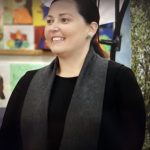 Tammy Anderson, a Biripi woman, first started teaching in 2002 as an Aboriginal Education Resource Teacher at Briar Road Public School, where she currently serves as the school’s Principal. Briar Road Public School is located in South Western Sydney, Australia and sits on the traditional lands of the Dharawal nation. Through her teaching Ms. Anderson developed a strong understanding of individualized learning and the importance that culture plays in academically and culturally developing Aboriginal students. Tammy has forged a successful 20-year career in public education and ensures that Aboriginal Education is at the forefront in both the schools and community in which she has worked and lived. She has drawn her inspiration for teaching and her passion for Aboriginal Education from both her family and students. She represents both education and her people on a number of National and state education advisory groups and organizations. Throughout her career Tammy has been awarded a number of awards highlighting her work in the space of Aboriginal Education.
Tammy Anderson, a Biripi woman, first started teaching in 2002 as an Aboriginal Education Resource Teacher at Briar Road Public School, where she currently serves as the school’s Principal. Briar Road Public School is located in South Western Sydney, Australia and sits on the traditional lands of the Dharawal nation. Through her teaching Ms. Anderson developed a strong understanding of individualized learning and the importance that culture plays in academically and culturally developing Aboriginal students. Tammy has forged a successful 20-year career in public education and ensures that Aboriginal Education is at the forefront in both the schools and community in which she has worked and lived. She has drawn her inspiration for teaching and her passion for Aboriginal Education from both her family and students. She represents both education and her people on a number of National and state education advisory groups and organizations. Throughout her career Tammy has been awarded a number of awards highlighting her work in the space of Aboriginal Education.
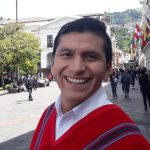 Carlos Chango Uñog is the first Ecuadorian Indian to graduate from Harvard University with a Master in Public Administration in International Development. He is an Ontological Coach certified by The Newfield Network. In addition, he graduated as an Agronomist and Agricultural Engineer from the Escuela Agrícola Panamericana – El Zamorano. He is trilingual, fluent in Kichwa, Spanish and English. Carlos is a Kichwa Indian from Chibuleo San Francisco, an indigenous community located 20 km from the city of Ambato, province of Tungurahua, in the central Andes of the Republic of Ecuador. He has consolidated his professional career working outside Ecuador in countries such as the Kazakhstan, Honduras, Guatemala and the United States. In Ecuador, he has held several leading positions in private, public and cooperation organizations, such as: Netherlands Cooperation – SNV, Ministry of Tourism, Ministry Coordinator of Production, Employment and Competitiveness – MCPEC, National Secretariat of Planning and Development – SENPLADES, Ministry of Agriculture and livestock and Procesadora Nacional de Alimentos – PRONACA. Currently, Carlos is Co-Founder and CEO at iChasky Consulting, an Ecuadorian social enterprise led by inDios whose mission is: To improve the world through the formation of people who, believing in themselves, achieve their dreams.
Carlos Chango Uñog is the first Ecuadorian Indian to graduate from Harvard University with a Master in Public Administration in International Development. He is an Ontological Coach certified by The Newfield Network. In addition, he graduated as an Agronomist and Agricultural Engineer from the Escuela Agrícola Panamericana – El Zamorano. He is trilingual, fluent in Kichwa, Spanish and English. Carlos is a Kichwa Indian from Chibuleo San Francisco, an indigenous community located 20 km from the city of Ambato, province of Tungurahua, in the central Andes of the Republic of Ecuador. He has consolidated his professional career working outside Ecuador in countries such as the Kazakhstan, Honduras, Guatemala and the United States. In Ecuador, he has held several leading positions in private, public and cooperation organizations, such as: Netherlands Cooperation – SNV, Ministry of Tourism, Ministry Coordinator of Production, Employment and Competitiveness – MCPEC, National Secretariat of Planning and Development – SENPLADES, Ministry of Agriculture and livestock and Procesadora Nacional de Alimentos – PRONACA. Currently, Carlos is Co-Founder and CEO at iChasky Consulting, an Ecuadorian social enterprise led by inDios whose mission is: To improve the world through the formation of people who, believing in themselves, achieve their dreams.
Rudi Colloredo-Mansfeld is Professor of Anthropology at the University of North Carolina at Chapel Hill. His scholarly work and teaching focuses on Indigenous peoples, agrarian transformations, artisans, consumer cultures and local food systems. His research has been supported by grants from the Fulbright program, The Wenner Gren Foundation, The National Science Foundation, National Geographic Society and the US State Department. He has served as president of the Society for Economic Anthropology, and Editor-in-Chief of the Journal of Latin American and Caribbean Anthropology. His books include The Native Leisure Class: Consumption and Cultural Creativity in the Andes and Fighting Like a Community: Andean Civil Society in an Era of Indian Uprisings. He received his M.A. and Ph.D. in anthropology from UCLA. He is a proud Carolina Tar Heel, graduating from UNC-Chapel Hill in 1987 as a Morehead Scholar, majoring in anthropology and European history.
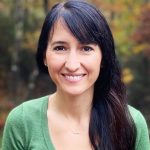 Kristin Davin is a professor in world language education at the University of North Carolina at Charlotte. She directs the world language teacher preparation program that offers licensure for teachers of many languages, including Cherokee. Her research focuses on language assessment, language teacher development, and language policies related to multilingualism. Her scholarship is informed by her prior work as a Spanish teacher at the elementary, middle, and high school levels.
Kristin Davin is a professor in world language education at the University of North Carolina at Charlotte. She directs the world language teacher preparation program that offers licensure for teachers of many languages, including Cherokee. Her research focuses on language assessment, language teacher development, and language policies related to multilingualism. Her scholarship is informed by her prior work as a Spanish teacher at the elementary, middle, and high school levels.
 Alex Dornburg is an Assistant Professor in Bioinformatics and Genomics at the University of North Carolina at Charlotte. His research focuses on using tools from genetics and evolutionary biology to inform contemporary decision making for topics that span human health to the persistence of biodiversity. His research has a strong marine biology emphasis, and he has conducted fieldwork in not only North Carolina, but also the waters of the Caribbean, Indo-Pacific, and Antarctica.His perspectives on student STEM engagement experience are additionally informed by his time working as a curator at the North Carolina Museum of Natural Sciences and developing STEM content for visitor groups of all ages.
Alex Dornburg is an Assistant Professor in Bioinformatics and Genomics at the University of North Carolina at Charlotte. His research focuses on using tools from genetics and evolutionary biology to inform contemporary decision making for topics that span human health to the persistence of biodiversity. His research has a strong marine biology emphasis, and he has conducted fieldwork in not only North Carolina, but also the waters of the Caribbean, Indo-Pacific, and Antarctica.His perspectives on student STEM engagement experience are additionally informed by his time working as a curator at the North Carolina Museum of Natural Sciences and developing STEM content for visitor groups of all ages.
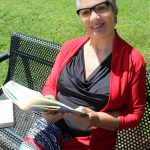 C.R. “Katie” Eddings (Lumbee), Social Studies Teacher, Lee Early College, was the 2019 Burrough Wellcome Fund North Central Region Teacher of the Year. Ms. Eddings’ inspiration for teaching is her mother who was an exceptional children’s teacher aide, bus driver, and library assistant at the elementary school that C.R. attended. Ms. Eddings graduated from Pembroke Senior High, in Pembroke, NC and entered Robeson Community College, where she received an Associate’s Degree in Police Science. She then joined the Air Force and served during Desert Storm. She later received a BA in Political Science from the University of Nevada – Las Vegas and an MSA from the University of North Carolina at Pembroke. Ms. Eddings’ teaching career began in 2004 in the Public Schools of Robeson County as a lateral entry middle school social studies/science teacher. She would go on to serve as an assistant principal. After five years, however, Katie found that she missed the classroom and became an Advancement Via Individual Determination (AVID) elective teacher with Lee County High School. Currently, she is teaching Personal Finance at Lee Early College. During the 2017-2018 school year Ms. Eddings was chosen as the AVID Summer Institute Teacher Speaker. In 2018 -2019, she was named Lee County Schools teacher of the Year and was chosen as the 2019 Burroughs Wellcome Fund North Central Region Teacher of the Year. She was also selected as the 2019 Lee County NAACP Educator of the Year. Ms. Edding’s believes her greatest accomplishment is seeing students reach their academic potential and find their passion.
C.R. “Katie” Eddings (Lumbee), Social Studies Teacher, Lee Early College, was the 2019 Burrough Wellcome Fund North Central Region Teacher of the Year. Ms. Eddings’ inspiration for teaching is her mother who was an exceptional children’s teacher aide, bus driver, and library assistant at the elementary school that C.R. attended. Ms. Eddings graduated from Pembroke Senior High, in Pembroke, NC and entered Robeson Community College, where she received an Associate’s Degree in Police Science. She then joined the Air Force and served during Desert Storm. She later received a BA in Political Science from the University of Nevada – Las Vegas and an MSA from the University of North Carolina at Pembroke. Ms. Eddings’ teaching career began in 2004 in the Public Schools of Robeson County as a lateral entry middle school social studies/science teacher. She would go on to serve as an assistant principal. After five years, however, Katie found that she missed the classroom and became an Advancement Via Individual Determination (AVID) elective teacher with Lee County High School. Currently, she is teaching Personal Finance at Lee Early College. During the 2017-2018 school year Ms. Eddings was chosen as the AVID Summer Institute Teacher Speaker. In 2018 -2019, she was named Lee County Schools teacher of the Year and was chosen as the 2019 Burroughs Wellcome Fund North Central Region Teacher of the Year. She was also selected as the 2019 Lee County NAACP Educator of the Year. Ms. Edding’s believes her greatest accomplishment is seeing students reach their academic potential and find their passion.
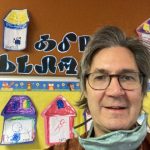 Hartwell Francis, PhD, is a theoretical linguist who has turned his attention to language preservation, revitalization, and education. He is the founding Director of the Western Carolina University Cherokee Language Program. He works with the Cherokee language speakers of the Eastern Band of Cherokee Indians to develop Cherokee language lessons, materials, and content for the New Kituwah Cherokee Language Immersion Academy. He’s happy to be here.
Hartwell Francis, PhD, is a theoretical linguist who has turned his attention to language preservation, revitalization, and education. He is the founding Director of the Western Carolina University Cherokee Language Program. He works with the Cherokee language speakers of the Eastern Band of Cherokee Indians to develop Cherokee language lessons, materials, and content for the New Kituwah Cherokee Language Immersion Academy. He’s happy to be here.
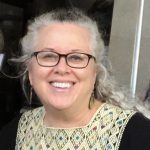 Jane Haladay is Professor of American Indian Studies at the University of North Carolina at Pembroke, where she teaches Native American literature and other AIS courses that incorporate service learning and writing enrichment. She has published a range of critical and creative work. Jane has received UNCP’s Excellence in Service-Learning Award (2016), the Outstanding Allyship Award from UNCP’s American Indian Heritage Center (2021), and the North Carolina Board of Governor’s Award for Excellence in Teaching (2023).
Jane Haladay is Professor of American Indian Studies at the University of North Carolina at Pembroke, where she teaches Native American literature and other AIS courses that incorporate service learning and writing enrichment. She has published a range of critical and creative work. Jane has received UNCP’s Excellence in Service-Learning Award (2016), the Outstanding Allyship Award from UNCP’s American Indian Heritage Center (2021), and the North Carolina Board of Governor’s Award for Excellence in Teaching (2023).
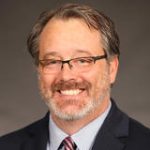 James J. Hudson completed his PhD from the University of Texas at Austin (2015), and since 2018 has served as an Assistant Professor in the Department of History at the University of North Carolina at Pembroke. His doctoral research focused on the modernization of Changsha, the capital of China’s Hunan province, during the late Qing and early Republican periods. His current research focuses on the history of American imperialism in China more broadly, and the impact of companies such as the Standard Oil Company of New York, as well as missionary organizations during the early twentieth century.
James J. Hudson completed his PhD from the University of Texas at Austin (2015), and since 2018 has served as an Assistant Professor in the Department of History at the University of North Carolina at Pembroke. His doctoral research focused on the modernization of Changsha, the capital of China’s Hunan province, during the late Qing and early Republican periods. His current research focuses on the history of American imperialism in China more broadly, and the impact of companies such as the Standard Oil Company of New York, as well as missionary organizations during the early twentieth century.
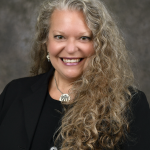 Joan Lachance is an Associate Professor at the University of North Carolina at Charlotte where she directs Teaching English as a Second Language (TESL) graduate and undergraduate programs. She is the co-author of the National Dual Language Education Teacher Preparation Standards and the Director of the CAEP Specialized Program Association in Dual Language Education called “EMMA: Education for a Multilingual Multicultural America.” Her research agenda includes collaboration and co-teaching in dual language, multilingual learner teacher preparation, and authentic assessment for multilingualism. Woven into her work she supports indigenous language reclamation via dual language education. Currently and most-honorably, she is collaborating with a dual language program serving the Eastern Band of the Cherokee Indians [EBCI].
Joan Lachance is an Associate Professor at the University of North Carolina at Charlotte where she directs Teaching English as a Second Language (TESL) graduate and undergraduate programs. She is the co-author of the National Dual Language Education Teacher Preparation Standards and the Director of the CAEP Specialized Program Association in Dual Language Education called “EMMA: Education for a Multilingual Multicultural America.” Her research agenda includes collaboration and co-teaching in dual language, multilingual learner teacher preparation, and authentic assessment for multilingualism. Woven into her work she supports indigenous language reclamation via dual language education. Currently and most-honorably, she is collaborating with a dual language program serving the Eastern Band of the Cherokee Indians [EBCI].
Dalton Locklear (Lumbee) is a senior at the University of North Carolina at Chapel Hill majoring in Human Development and Family Science. He hails from Shannon, North Carolina, and is a proud member of the Lumbee Tribe of North Carolina. Dalton is heavily involved in cultural organizations, such as the Carolina Indian Circle and Phi Sigma Nu Fraternity, Incorporated. His passions include diversity, equity, inclusion, education policy, and the academic achievement of Indigenous students. Dalton’s future career plans include teaching elementary students and school administration.
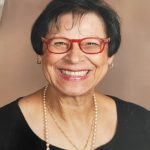 Betty Oxendine Mangum is an enrolled member of the Lumbee Tribe of North Carolina. She was born in Robeson County. She spent many years in the classroom as a teacher and then worked in educational administration, including as Director of Indian Education at the NC Department of Public Instruction. Ms. Mangum has a B.A. in elementary education from UNC Pembroke and a M.A. in educational administration and supervision from NC Central University. She has contributed and consulted on many projects and initiatives, including curriculum, children’s books, television programming and art exhibits, to ensure accuracy and authenticity of American Indian representation. She is currently the Elder-in-Residence at the Carolina American Indian Center.
Betty Oxendine Mangum is an enrolled member of the Lumbee Tribe of North Carolina. She was born in Robeson County. She spent many years in the classroom as a teacher and then worked in educational administration, including as Director of Indian Education at the NC Department of Public Instruction. Ms. Mangum has a B.A. in elementary education from UNC Pembroke and a M.A. in educational administration and supervision from NC Central University. She has contributed and consulted on many projects and initiatives, including curriculum, children’s books, television programming and art exhibits, to ensure accuracy and authenticity of American Indian representation. She is currently the Elder-in-Residence at the Carolina American Indian Center.
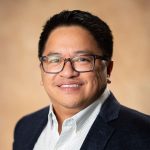 Rainier (Rain) Masa is an associate professor at the UNC-Chapel Hill School of Social Work. He is a lead researcher with the Global Social Development Innovations Center and a research fellow at the Centre for Social Development in Africa at the University of Johannesburg. He is also a faculty affiliate of the UNC African Studies Center and a member of the UNC Center for AIDS Research. Dr. Masa’s research focuses on the economic and social aspects of health in low-resource communities. He conducts research on the intersection of economic security and HIV among adolescents and young adults. He examines how food access, economic vulnerability, and stigma affect risk for HIV transmission and progression along the HIV care continuum, particularly among key populations. Dr. Masa has a B.A. from the University of Santo Tomas (Manila, Philippines), a M.S.W. from Washington University in St. Louis and a Ph.D. from UNC-Chapel Hill.
Rainier (Rain) Masa is an associate professor at the UNC-Chapel Hill School of Social Work. He is a lead researcher with the Global Social Development Innovations Center and a research fellow at the Centre for Social Development in Africa at the University of Johannesburg. He is also a faculty affiliate of the UNC African Studies Center and a member of the UNC Center for AIDS Research. Dr. Masa’s research focuses on the economic and social aspects of health in low-resource communities. He conducts research on the intersection of economic security and HIV among adolescents and young adults. He examines how food access, economic vulnerability, and stigma affect risk for HIV transmission and progression along the HIV care continuum, particularly among key populations. Dr. Masa has a B.A. from the University of Santo Tomas (Manila, Philippines), a M.S.W. from Washington University in St. Louis and a Ph.D. from UNC-Chapel Hill.
Chris Scott (Lumbee), a native of Robeson County, North Carolina, specializes in principal and superintendent leadership preparation. After 15 years in public school and district leadership, he joined the UNC School of Education in 2017, where he currently is a clinical assistant professor and executive director of UNC LEADS (Principal Fellows). In addition to teaching, advising and supervising graduate educational leadership students, he has also designed and delivered professional development on transformational and instructional leadership both in the US and abroad. Even Dr. Scott serves as a clinical faculty member and balances his teaching with supervision of aspiring principals and superintendents, he also has a continued interest in research that addresses the academic achievement and ethnic identity development of American Indian students in K-12 and higher education. His research interest also include the educational experiences of historically marginalized students, school and district leadership for equity and social justice, and leadership preparation.
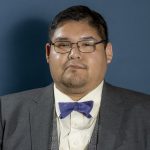 Matthew Tooni is a professional musician and storyteller. Currently, he works at the New Kituwah Cherokee Language Immersion Academy in Cherokee, NC, as a Cherokee language specialist. Mr. Tooni frequently uses stories in his classroom to educate children about Cherokee history, culture, language, and values.
Matthew Tooni is a professional musician and storyteller. Currently, he works at the New Kituwah Cherokee Language Immersion Academy in Cherokee, NC, as a Cherokee language specialist. Mr. Tooni frequently uses stories in his classroom to educate children about Cherokee history, culture, language, and values.
Sessions
Teaching Cultural Capability and Voice/Choice
Katie Eddings (Lumbee), Social Studies Teacher, Lee Early College
Cultural Capability: refers to the skills, knowledge, behaviors and systems that are required to plan, support, improve and deliver services in a culturally respectful manner. The workshop will provide an opportunity for participants to reflect on their cultural capability. The framework comprises four domains (to know, to do, to belong and to be). We will discuss how these four domains can be used as a reflected tool for participants on progress and to assist in the development of strategies toward being culturally capable and responsive (starting from culturally aware in the short term, to being culturally responsive as the end goal).
Integrating STEM and Culture to Increase Student Engagement
Alex Dornburg, Assistant Professor of Bioinformatics, UNC Charlotte
Kristin Davin, Professor of World Language Education, UNC Charlotte
Joan Lachance, Associate Professor and Director, TESL, UNC Charlotte
The past decade has witnessed tremendous efforts towards the broadening of STEM participation. However, numerous communities still find themselves notably marginalized. For example, there has been almost no growth of indigenous students in STEM and they are the least likely to see investment in STEM initiatives nationwide. In this session, we review the landscape of culturally aware science education efforts, with a special focus on STEM education within indigenous communities. We spotlight our preliminary work with the Eastern Cherokee Community, in which we are collaboratively working towards developing curriculum and activities that integrate indigenous culture and language with STEM. We conclude by inviting participants to share their insights, suggestions, and experiences concerning the potential of combining cultural perspectives and STEM education for fostering increased student engagement and success.
Some Resources for Learning about Indigeneity in China: The Uyghur Ethnic Group
James J. Hudson, PhD. Assistant Professor, Department of History, University of North Carolina at Pembroke
The session will include a brief overview of the history of the Uyghur minority, an Indigenous group from central Asia. Uyghurs are predominantly Muslim and inhabit China’s far western province of Xinjiang. According to the Uyghur Human Rights Project, “since 2017, an estimated one to two million Uyghurs and other Turkic Peoples in the XUAR (Xinjiang Uyghur Autonomous Region) have been detained in reeducation camps.” Detainees comprise a wide stratum of Uyghur society and have included prominent academics and scholars. Once detained, they have been separated from families and subjected to political indoctrination. They are forbidden to practice Islam. Women have been subjected to forced sterilization and contraception. The session will also introduce some useful primary and secondary source materials for K-12 educators, for students to learn more about the history and current plight of the Uyghurs. [UHRP Staff. “The Happiest Muslims in the World: Disinformation, Propaganda, and the Uyghur Crisis.” Uyghur Human Rights Project, July 2020, 5. https://docs.uhrp.org/pdf/Disinformation_Propganda_and_the_Uyghur_Crisis.pdf.]
Exploring the World We Live In: Local Natural Resources and Indigenous Language Education
Hartwell Francis, PhD, Education Curriculum Developer, Kituwah Preservation and Education Program of the EBCI
We will discuss our work with the Cherokee language speakers of the Eastern Band of Cherokee Indians. We work with speakers on language and culture projects. Our projects include trips into the natural landscape to gather food and resources. We will discuss several of our trips and present our audience with cultural lessons based on the food and resources we gather. We will discuss visiting the blueberry patch. We will discuss visiting the rivercane break. We will discuss making bean bread. We will discuss cornhusk dolls. We will tie these trips to materials we use for lessons in our K-6 Cherokee language immersion school and we will discuss how these lessons can be used in higher grades.
Leading with a First Peoples View, Leading a Culturally Nourishing School Community
Tammy Anderson, Biripi Woman and Principal, Briar Road Public School, Sydney, Australia (Zoom)C.R. Katie Eddings – Lumbee Woman and teacher at Lee Early College
First Nations leaderships involves doing the same things differently. Applying the First Nations lens to school leadership has assisted lift academic success, strengthened the sense of belonging for all and has sustained agreed cultural norms in a significantly disadvantaged community in south western Sydney Australia. Teachers will learn of the fundamental practices which have driven and sustained transformational change in a community that’s origins are one the oldest surviving culture in the world.
Coming Home: Affirming Community through Lumbee Children’s Literature
Jane Haladay, PhD, Professor of American Indian Studies, UNC Pembroke
This session will focus on two recent Lumbee-authored children’s books to highlight ways in which elementary teachers and students can connect through teaching the culturally relevant, place-based literatures of Indigenous peoples. In this session, educators will learn about the specific books upon which I have based a university-community service-learning literacy activity in my UNCP Native American literature classes for the past decade, receive copies of the activity to modify for their own use, share ideas based on their own experiences teaching Indigenous children’s literature, discuss best practices for respectful teaching of these literature, and learn about resources for locating authentic Indigenous children’s literature in their classrooms.
Why We Tell These Stories: Cherokee Story Telling In K-12 Education
Matthew Tooni, Cherokee Language Specialist, Kituwah Preservation and Education Program of the EBCI
We discuss the use of traditional Cherokee stories in K-12 and community education. In our work, we focus on the use of the stories for teaching Cherokee language. But we also find that the stories contain the history, culture, and values of the Cherokee people. We discuss story telling as an indigenous art. We address the question of appropriation in telling the stories of other peoples and we encourage our participants to use the stories we present in their own classrooms in the proper way. We present How the Groundhog Lost Its Tail as an English language unit and we provide the lessons of the unit to our audience. We provide additional resources for the use of Cherokee stories in K-12 classrooms.
The Wide-Ranging Effects of Household Food Insecurity and Their Implications for Educational Equity
Rainier Masa, Associate Professor, UNC School of Social Work and Research Director, Global Social Development Innovations
The session will review the different dimensions of food insecurity, its predictors, and their relationship with students’ well-being. The presenters will highlight evidence from their own research in South Africa to illustrate the wide-ranging effects of food insecurity. In addition, the prevalence of household food insecurity among American Indians and Alaska Natives will be presented using nationally representative data of adults and households in the United States. Implications for equity in educational success will be discussed.
Native Educators Past, Present, and Future: A Conversation
Betty Oxendine Mangum (Lumbee), Retired Educator and Administrator, North Carolina Department of Public Instruction and Department of Education
Chris Scott (Lumbee), Executive Director, UNC LEADS, Clinical Assistant Professor, UNC-Chapel Hill
Dalton Locklear (Lumbee), UNC Undergraduate Scholar, Human Development and Family Science Major/Education Minor
This session brings together three generations of Native educators to discuss the individual paths and shared experiences that brought each of them to education. Mrs. Betty Oxendine Mangum, Dr. Chris Scott, and UNC undergraduate, Dalton Locklear, reflect on goals, challenges, successes, and opportunities for Native educators and offer attendees a unique and critical perspective on indigeneity in the classroom.
Carlos Chango Uñog, Co-Founder and CEO, iChasky Consulting (Zoom)
Rudi Colloredo-Mansfeld, Professor, Anthropology, UNC-Chapel Hill
Join Professor Rudi Colloredo- Mansfeld as he interviews ( via zoom) Mr. Carlos Chango Uñog. Mr. Uñog is a Kichwa Indian from Chibuleo San Francisco, an Indigenous community located 20 km from the city of Ambato, province of Tungurahua, in the central Andes of the Republic of Ecuador. Mr. Uñog is trilingual, fluent in Kichwa, Spanish, and English and the first Ecuadorian Indian to graduate from Harvard University with a Master’s in Public Administration in International Development. Currently, Mr. Uñog is Co-Founder and CEO at iChasky Consulting, an Ecuadorian social enterprise led by inDios whose mission is to improve the world through the formation of people who, believing in themselves, achieve their dreams. Mr. Uñog is a supporter of educators worldwide and looks forward to the discussion with Professor Colloredo- Mansfeld and meeting UNC World View participants via Zoom.
Program Materials
To receive 1.0 CEU you must attend the program and turn in a completed study guide. Study guide information will be emailed directly to all registered participants.
Directions/Parking
The Symposium is at the Friday Conference Center
100 Friday Center Drive
Chapel Hill, NC 27517
Click HERE for directions and a permit for the Friday Conference Center visitor lot.
Program Policies
To review UNC World View’s program policies (including photography, social media, refund, and cancellation policies), click HERE.
Support Provided By:
Anonymous Trust
Longview Foundation
Office of the Provost
WRESA

